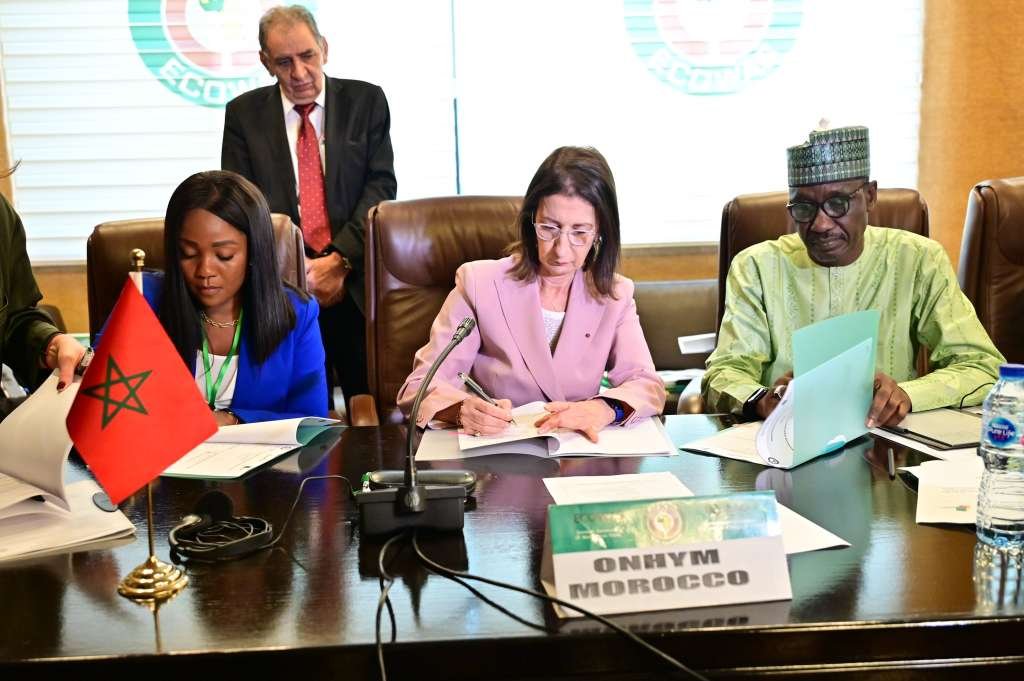NNPC, Morocco and Benin signs gas pipeline agreement

As part of the Nigeria-Morocco Gas Pipeline (NMGP) project, the Nigerian National Petroleum Company (NNPC) Limited has signed four memorandums of understanding (MoUs) with five African nations.
The national oil company reported that the agreement had been reached with Morocco, Cote d’Ivoire, Liberia, Benin, and Guinea.
The MoUs were signed at the Economic Community of West African States (ECOWAS) headquarters in Abuja on Friday, according to a statement released by NNPC spokesperson Garba Deen Muhammad on Friday.
According to him, the signings happened concurrently with a meeting of the steering committee for the Nigeria-Morocco gas pipeline project, which was also attended by delegates from ECOWAS and all of the other participating nations.
Nigeria, Benin, Togo, Ghana, Côte d’Ivoire, Liberia, Sierra Leone, Guinea, Guinea-Bissau, The Gambia, Senegal, Mauritania, and Morocco are among the participating nations, according to Muhammad.
“Today, four crucial Memorandums of Understanding (MoU) pertaining to the Nigeria-Morocco Gas Pipeline Project were signed at the ECOWAS headquarters, marking another critical milestone. The steering group of the project also met to go over its progress and strategic course, according to the statement.
The National Oil Company of Liberia (NOCAL), the National Hydrocarbons Company of Benin (SNH-Benin), the National Petroleum Company of the Republic of Guinea (SONAP), the National Office of Hydrocarbons and Mines (ONHYM) of Morocco, the National Company of Petroleum Operations of Cote d’Ivoire (PETROCI), and the National Oil Company of Liberia (NOCAL) were all parties to the MOUs, according to Muhammad.
The agreements, which, according to him, reaffirm the parties’ commitment to the project, are comparable to those signed with ECOWAS on September 15, 2022, Mauritania and Senegal on October 15, 2022, and The Gambia, Guinea-Bissau, Sierra Leone, and Ghana on December 5, 2022.
The project would improve the monetization of the natural gas resources of the impacted African nations, according to the NNPC spokeswoman, and it would also provide a new alternate export route to Europe.
The sub-region’s economies will be integrated, the population’s living standards will be improved, and desertification will be lessened thanks to this important infrastructure project, he said.
The provision of a sustainable and dependable gas supply that complies with the continent’s new environmental obligations would help to achieve these objectives while giving Africa a new economic, political, and strategic dimension.
Mele Kyari, group chief executive officer (CEO) of NNPC, praised President Bola Tinubu’s government for entrusting the corporation with the important project in its capacity as the country’s energy provider during his remarks.
As a for-profit company, NNPC, he continued, saw the project as “a chance to monetise Nigeria’s abundant hydrocarbon resources by expanding access to energy to support economic growth, industrialization, and job creation across the African continent and beyond.”
Amina Benkhadra, director-general of ONHYM, also spoke at the event. She stated that it is a positive step toward achieving total development of Africa by Africans by assuring social and economic growth through energy security and accessibility.
The Nigeria, Benin, Togo, Ghana, Cote d’ lvoire, Liberia, Sierra Leone, Guinea, Guinea Bissau, Gambia, Senegal, and Mauritania Natural Gas Pipeline (NMGP) is a 5,600 km gas pipeline project that crosses 13 African nations.
